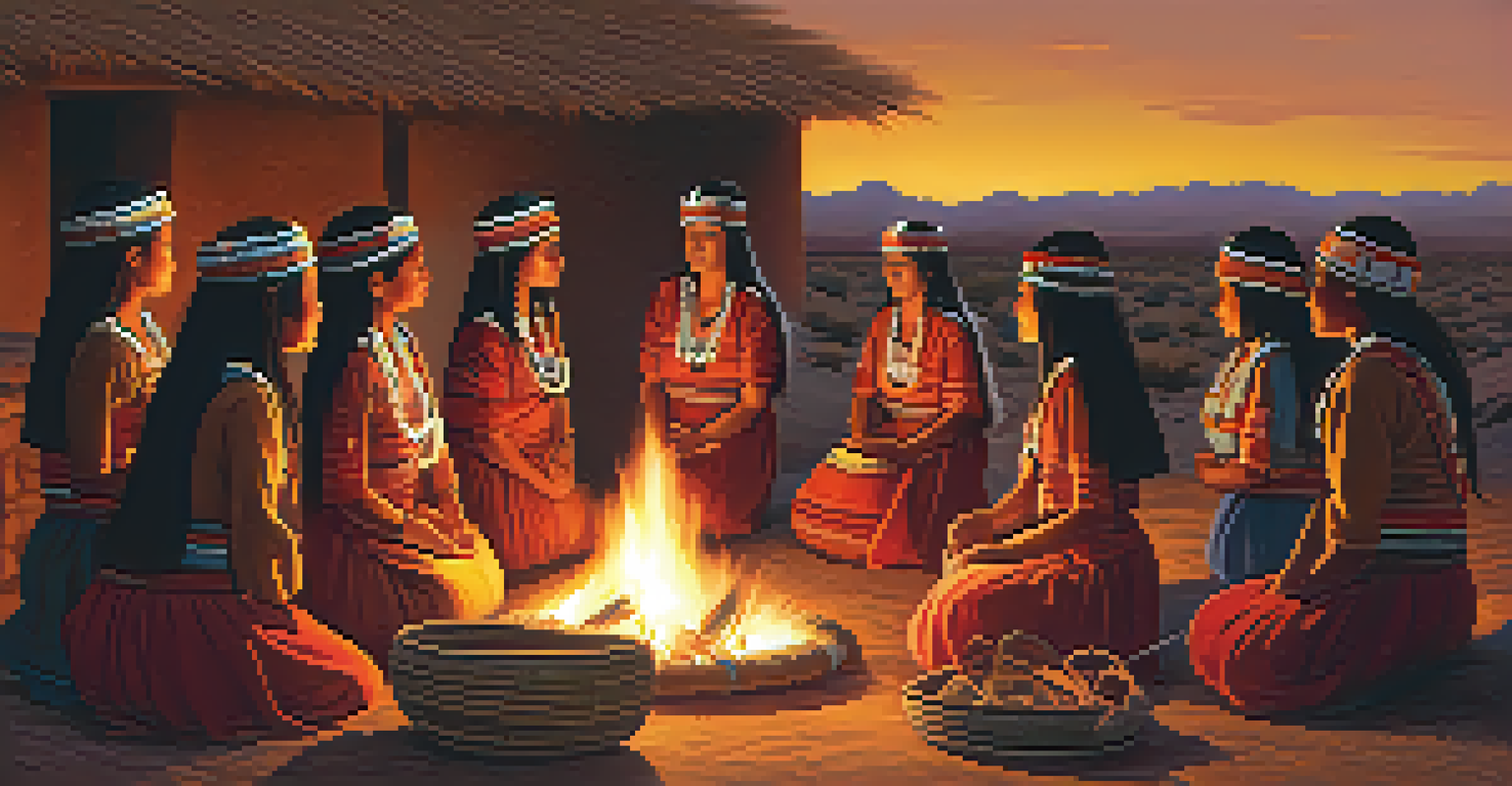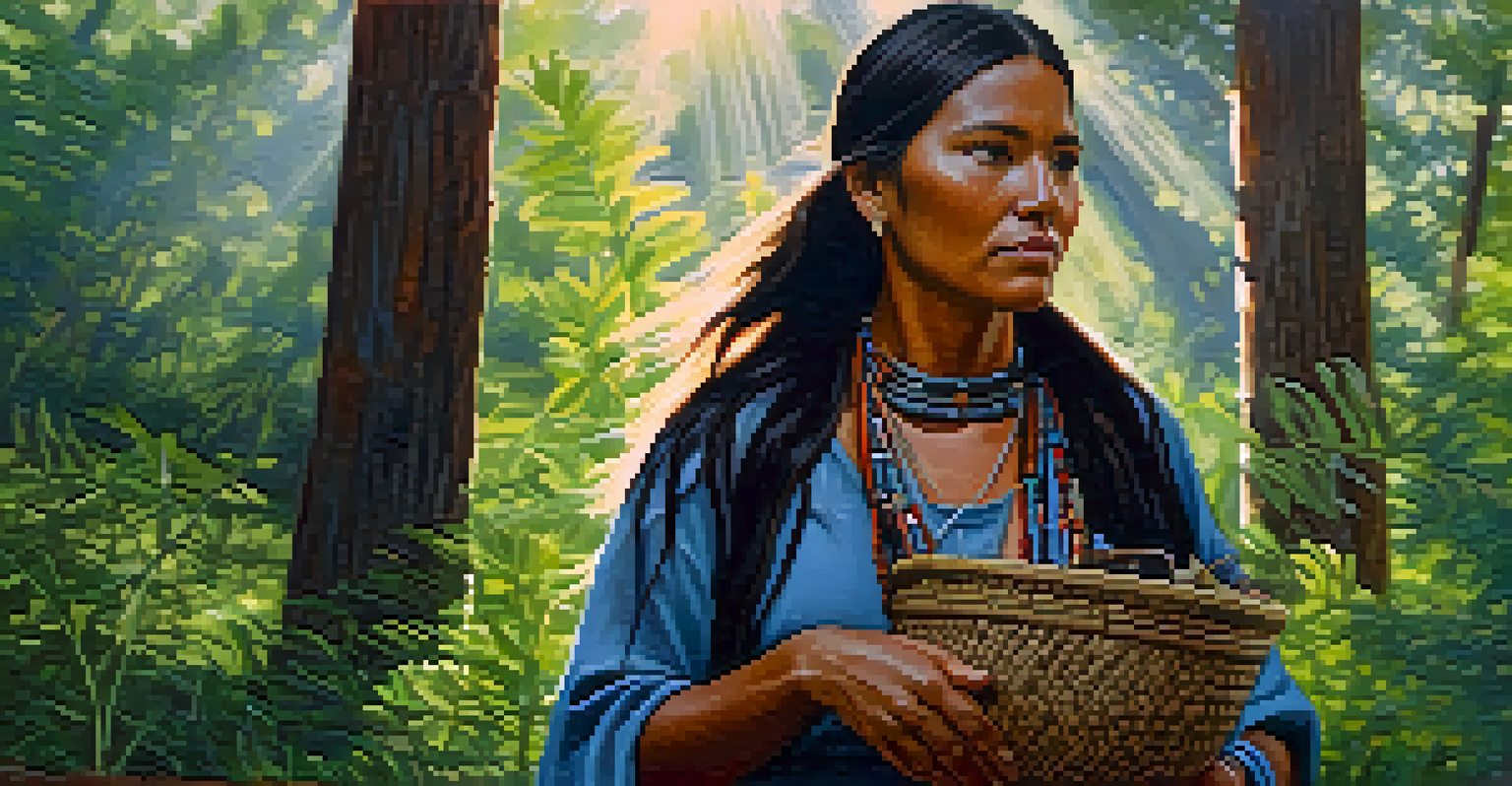The Role of Women in Apache, Hopi, and Navajo Societies

Historical Perspectives on Women in Native American Societies
Throughout history, women in Apache, Hopi, and Navajo societies have played crucial roles. Their contributions have often been overlooked, but they were central to the social fabric of their communities. By examining historical accounts, we can appreciate the strength and resilience of these women.
Women are the backbone of our societies, the carriers of culture and tradition.
In Apache society, women were not just caregivers; they were also leaders, warriors, and skilled artisans. Their influence extended beyond the home, impacting decisions that affected the tribe as a whole. Similarly, Hopi women were essential in sustaining agricultural practices, which were vital for survival.
Navajo women, too, have a rich history of leadership and cultural preservation. They have traditionally held the responsibility for weaving, a craft deeply intertwined with Navajo identity. This historical context underscores the importance of recognizing women's roles in shaping their societies.
Social Structures: The Position of Women
In Apache culture, women enjoyed a relatively high status in their social structures. They were often the decision-makers in family matters and had the authority to choose their partners. This empowerment fostered a sense of respect and equality within the community.

Hopi society also revered women, who held significant responsibilities in both the home and the spiritual realm. Women were seen as the keepers of culture, passing down traditions and rituals to future generations. Their roles were vital in maintaining the community's identity.
Crucial Roles of Indigenous Women
Women in Apache, Hopi, and Navajo societies have historically held significant roles that shaped their communities and cultures.
Similarly, Navajo women are recognized as the backbone of their families and communities. They play a crucial part in the matrilineal system, where lineage and inheritance are traced through mothers. This system emphasizes their pivotal role in sustaining family ties and cultural heritage.
Economic Contributions of Women in Apache Society
Women in Apache societies contributed significantly to their economies through various means. They were skilled gatherers, hunters, and artisans, providing essential resources for their communities. This diverse skill set allowed them to play an integral role in the survival of their families.
The role of women in society is often underestimated, yet they are the ones who build the foundation of culture and community.
In addition to gathering wild plants and herbs, Apache women crafted tools and clothing, showcasing their remarkable abilities. These economic contributions not only supported their households but also enabled the trade of goods with neighboring tribes. This trade fostered relationships and strengthened community ties.
Moreover, their knowledge of the land and resources was invaluable. Apache women often passed down this knowledge to younger generations, ensuring that their skills and traditions continued. Their economic roles underline the importance of women in sustaining and nurturing their societies.
Cultural Preservation: The Role of Women in Hopi Society
In Hopi culture, women are the primary custodians of traditions and ceremonies. They are responsible for the preparation of sacred rituals, which are crucial to the community's spiritual life. This role highlights their importance in maintaining Hopi cultural identity.
Hopi women also engage in pottery and weaving, forms of artistic expression that carry deep cultural significance. Through their craftsmanship, they tell stories and preserve history, connecting the past with the present. This artistic legacy has become a vibrant part of Hopi culture.
Economic and Cultural Contributions
Indigenous women contributed to their economies through various skills while also preserving cultural traditions and practices.
Furthermore, the participation of women in ceremonies reinforces their role in community cohesion. Their presence and contributions during these events foster unity and continuity, ensuring that the teachings and values of their ancestors remain alive.
Leadership Roles of Navajo Women
Navajo women have historically held leadership positions within their communities, influencing both social and political spheres. They often played key roles in family decision-making processes and were involved in tribal governance. This involvement demonstrates their authority and respect within Navajo society.
In times of crisis, such as during conflicts or hardships, Navajo women have stepped up as leaders. Their resilience and ability to mobilize communities during challenging times highlight the strength of their leadership. This role has been crucial in preserving Navajo culture and identity.
Moreover, women's leadership extends to community initiatives and educational efforts. Many Navajo women are active in programs that promote cultural education and empowerment. Their leadership is not only about authority but also about nurturing and guiding future generations.
Spiritual Significance of Women in Apache, Hopi, and Navajo Culture
Women in Apache culture hold spiritual significance, often serving as healers and spiritual leaders. Their deep understanding of herbal medicine and rituals connects them to both the physical and spiritual worlds. This role emphasizes the integral part women play in the holistic well-being of their communities.
In Hopi society, women are essential in maintaining the spiritual life of the tribe. They participate in and lead ceremonies that honor the earth and its cycles, reinforcing their connection to nature. This spiritual commitment fosters a sense of harmony and balance within the community.
Resilience Amid Modern Challenges
Today, Indigenous women continue to face challenges but remain resilient, advocating for their rights and the preservation of their cultures.
Navajo women also embody spiritual strength, with many serving as practitioners of traditional healing and ceremonies. Their connection to the land and the cosmos reflects a profound understanding of the world around them. This spiritual dimension adds depth to their roles as cultural bearers and leaders.
Modern Challenges and Resilience of Indigenous Women
Today, women in Apache, Hopi, and Navajo societies face modern challenges, including economic hardships and cultural erosion. Despite these obstacles, they continue to advocate for their rights and preserve their cultures. This resilience speaks volumes about their strength and determination.
Many Indigenous women are leading movements to reclaim their rights and amplify their voices. They are actively involved in initiatives that focus on education, health, and environmental issues. This engagement showcases their commitment to both their communities and the wider society.

Furthermore, the resurgence of traditional practices and the integration of modern advocacy demonstrate the adaptability of these women. They are not only preserving their heritage but also shaping the future for the next generations, proving that their roles are just as vital today as they have always been.